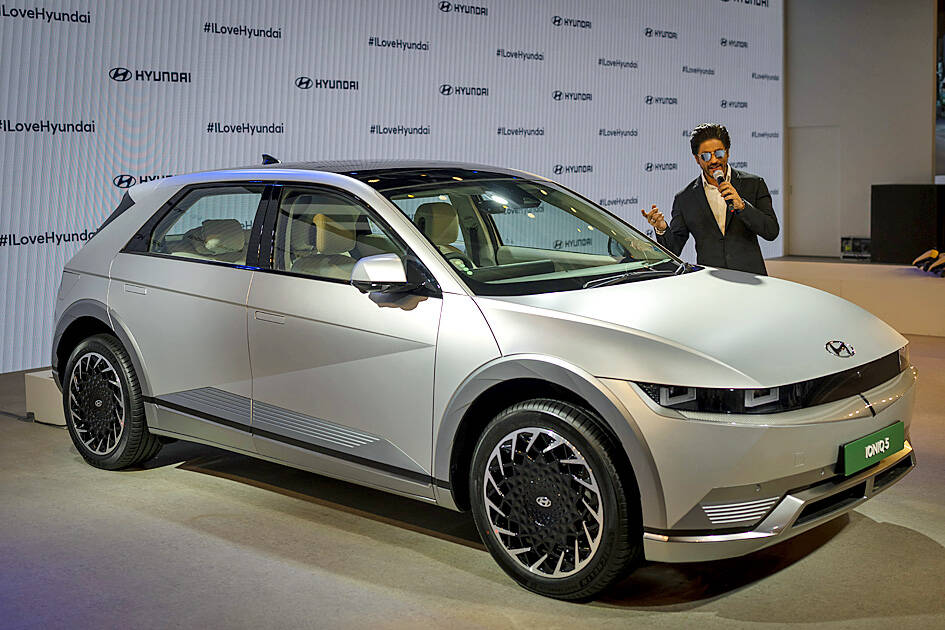Hyundai Motor Co said it would sell 2 million electric vehicles (EVs) annually by 2030, raising its forecast from 1.87 million a year earlier, as demand for clean-energy vehicles continues to surge.
The South Korean automaker also plans to spend about 109 trillion won (US$84.8 billion) to boost production and make progress in areas such as hydrogen vehicles, it said in a statement yesterday.
The investment pledge from the world’s third-biggest automaker follows Toyota Motor Corp laying out an ambitious plan to sell 1.5 million battery EVs by 2026. Ford Motor Co is pursuing a radical restructuring with ambitions to make 2 million EVs a year by 2026.

Photo: AP
Hitting the new goal would mean thatHyundai’s EVs, including luxury brand Genesis, would account for 18 percent of its global sales in 2026 and 34 percent in 2030, the company said.
They would make up 53 percent of its sales in three key markets — South Korea, the US and Europe — by the end of the decade. Volkswagen AG expects electric-battery vehicles to account for 20 percent of its global sales by 2025.
Hyundai and Kia Motors Corp have sold about 109,000 EVs this year, placing them fifth in the global industry, BloombergNEF said.
Hyundai is facing pressure in the US and Europe to increase domestic production of clean vehicles and reduce reliance on battery minerals and components made in China.
The company aims to start mass production at its EV plant being built in the US state of Georgia in the second half of next year, CEO Jay Chang said at an annual event for investors yesterday.
Meanwhile, Renault SA on Monday laid out financial goals for its EV arm Ampere — including to break even on an operating basis as soon as 2025 — as it readies the division for an initial public offering.
The French automaker, which described the unit as “a growth story,” is targeting a 30 percent compound annual growth rate until 2030, the firm said in a statement.
Renault CEO Luca de Meo would take on the additional roles of CEO and chairman of the EV arm.
Even as Renault gives an upbeat outlook for Ampere, the business faces several challenges as De Meo works to bring it to market. Price cuts in Europe from US rival Tesla Inc, for example, risk denting demand for a new model touted as key for the automaker’s turnaround, the fully electric Megane E-Tech.
To fend off the competition, Renault is reintroducing a lower-priced Megane E-Tech version featuring a smaller battery.

Quanta Computer Inc (廣達) chairman Barry Lam (林百里) is expected to share his views about the artificial intelligence (AI) industry’s prospects during his speech at the company’s 37th anniversary ceremony, as AI servers have become a new growth engine for the equipment manufacturing service provider. Lam’s speech is much anticipated, as Quanta has risen as one of the world’s major AI server suppliers. The company reported a 30 percent year-on-year growth in consolidated revenue to NT$1.41 trillion (US$43.35 billion) last year, thanks to fast-growing demand for servers, especially those with AI capabilities. The company told investors in November last year that

Intel Corp has named Tasha Chuang (莊蓓瑜) to lead Intel Taiwan in a bid to reinforce relations between the company and its Taiwanese partners. The appointment of Chuang as general manager for Intel Taiwan takes effect on Thursday, the firm said in a statement yesterday. Chuang is to lead her team in Taiwan to pursue product development and sales growth in an effort to reinforce the company’s ties with its partners and clients, Intel said. Chuang was previously in charge of managing Intel’s ties with leading Taiwanese PC brand Asustek Computer Inc (華碩), which included helping Asustek strengthen its global businesses, the company

Taiwanese suppliers to Taiwan Semiconductor Manufacturing Co. (TSMC, 台積電) are expected to follow the contract chipmaker’s step to invest in the US, but their relocation may be seven to eight years away, Minister of Economic Affairs J.W. Kuo (郭智輝) said yesterday. When asked by opposition Chinese Nationalist Party (KMT) Legislator Niu Hsu-ting (牛煦庭) in the legislature about growing concerns that TSMC’s huge investments in the US will prompt its suppliers to follow suit, Kuo said based on the chipmaker’s current limited production volume, it is unlikely to lead its supply chain to go there for now. “Unless TSMC completes its planned six

Power supply and electronic components maker Delta Electronics Inc (台達電) yesterday said it plans to ship its new 1 megawatt charging systems for electric trucks and buses in the first half of next year at the earliest. The new charging piles, which deliver up to 1 megawatt of charging power, are designed for heavy-duty electric vehicles, and support a maximum current of 1,500 amperes and output of 1,250 volts, Delta said in a news release. “If everything goes smoothly, we could begin shipping those new charging systems as early as in the first half of next year,” a company official said. The new